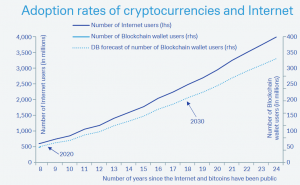Deutsche Bank: Fiat Money is Fragile, Crypto – Inevitable
The forces that hold the fiat money system together look fragile and, over the next decade, some of these forces could begin to unravel and demand for alternative currencies, from gold to crypto, could take off, German banking giant Deutsche Bank said in its recent report Imagine 2030.

“While critics bemoan cryptocurrencies as constrained by regulatory hurdles, we believe the incentives of governments and card providers are such that digital currencies are inevitable,” the report prepared by Deutsche Bank Research said, adding that it would not be surprising if a new and mainstream cryptocurrency were to unexpectedly emerge in the next decade.
While cryptocurrencies have not managed to take off as a means of payment despite their well-known benefits, such as security, speed, minimal transaction fees, ease of storage and relevance in the digital era, this may change in the next decade. Assuming governments back cryptocurrencies, and consumers want them, and if current trends continue, there could be 200m blockchain wallet users in 2030 and crypto might eventually replace cash, the researchers estimated.
“According to dbDig [Deutsche Bank Data Innovation Group] primary research, nearly two thirds of consumers prefer dematerialised to cash payments and a third are concerned by anonymity. These are the two things that cryptocurrencies do best,” the report said.
Also, China and India will play a very important role: “Until now, China and India banned the purchase and the sale of cryptocurrencies. But things are moving quickly.”

In the meantime, the researchers stressed that cryptocurrencies need to overcome three main hurdles to become widespread:
- First, they must become legitimate in the eyes of governments and regulators. That means bringing stability to the price and bringing advantages to both merchants and consumers.
- They must also allow for global reach in the payment market. To do this, alliances must be forged with key stakeholders – mobile apps such as Apple Pay, Google Pay, card providers such as Visa and Mastercard, and retailers, such as Amazon and Walmart.
- To envision a smooth transmission towards a fully digitalised platform, the financial system needs to be ready to overcome any kind of electricity shutdown or cyberattack.
Meanwhile, the traditional banking giant said in its report that they “think fiat money systems should be inherently unstable and prone to high inflation all other things being equal.”
“Politically it is always too tempting to create money when nothing is backing it. That this current fiat system has survived so long has required a fortuitous set of global forces across multiple decades that have created sizeable natural offsetting disinflationary forces,” they said.
According to the researchers, it is possible that inflation will become more and more embedded in our system and doubts will rise about the sustainability of fiat money.
“The demand for alternative currencies will therefore likely be significantly higher by the time 2030 rolls around,” they concluded leaving “the multi-trillion dollar (or bitcoin) question” whether fiat currencies survive the policy dilemma in the next decade unanswered. Authorities will need to find a way to balance higher yields with record levels of debt.
We have lived in an era of fiat money since the early 1970s. Since then virtually all money in existence has only had a value based on trust and, in particular, trust in governments’ ability to maintain its value. Prior to this period, most of the money in existence through history was backed by a commodity – usually a precious metal like gold or silver.
Meanwhile, a survey has found that less than one-third of the surveyed Japanese citizens are in favor of mainstream cryptocurrency adoption. Per App Times, the Japanese Ministry of Education surveyed some 3,000 citizens, 82% of whom said they wanted to see more advances in robotics. 80% of respondents said they wanted a future where 5G telecoms networks played a key role. But only 30% of the respondents, all aged between 15 and 69, said they saw a key role for cryptocurrencies in the future.




